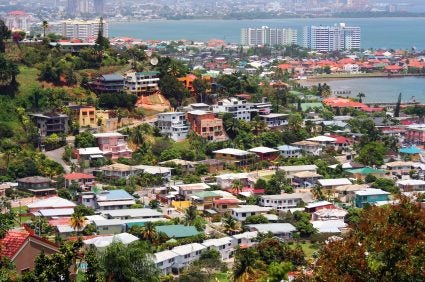Hillside view of tropical city Port of Spain, Trinidad.
It’s time to start planning before urbanizing … and today we tell you how to apply for an opportunity to investigate and deepen your knowledge on urban development.
Cities are engines of economic, social and cultural growth, but they also present challenges for sustainable and integral development. The way cities respond to these challenges in a sustainable, equitable and competitive way will depend on how they manage their territory, their infrastructure, their housing options and land use. Urban planning is a critical tool to address this.
We invite you to apply to the Visiting Scholarship Program call for research proposal, a joint initiative of the Inter-American Development Bank (IDB) and the Korean Research Institute for Human Settlements (KRIHS).
This program seeks to conduct joint research on Latin America and the Caribbean in urban issues and find implications through a comparison with the case of South Korea.
The Korean experience offers a unique opportunity, since this country has achieved sustained rapid economic growth in recent decades. The Korean urban planning and institutional system have played a key role to achieve this development.
This year, the program will focus on three research areas:
- Metropolitan Governance
Cities are growing rapidly outstripping the original administrative boundaries and interacting with other urban areas creating metropolitan areas. To take advantage of the productive potential of these metropolitan areas and to push national competitiveness and economic growth is important to have adequate institutions and determine an efficient management of such conglomerates. In Seoul, the government has invested conspicuously for the Seoul Metropolitan Area (SMA). An important element of metropolitan governance is to have a transport infrastructure. To address traffic congestion and concentration of population in the SMA, the government has implemented an excellent model of transit-oriented development.
- Special Economic Zones
To improve the living conditions of the nation and control population growth, Korea has created special economic zones where it concentrates specific urban functions. An example is the Incheon Free Economic Zone (IFEZ) created in 2003 as a center for Cooperation Initiative Northeast Asia and to respond to domestic economic demands in response to the economic crisis of the 1990s. IFEZ has been designed to provide ideal conditions for business and tax advantages, logistical support and administrative services to attract high-quality foreign direct investment and at the same time pushing national competitiveness.
- Land Management
In the area of land management, the Korean government has established a series of master plans – the Comprehensive National Territorial Plans (CNTP) – in which it incorporates the fundamental elements of urban and regional development, determines the location for industries, transport infrastructure and information, housing and land use.
South Korea has several and successful experiences. This is a unique opportunity to learn from their model of development. The program is offered in English, so participants must be proficient in this language.
Don´t miss the opportunity to be part of the urban planning of Latin America and the Caribbean!
Find out more information on the call in English and Spanish.
Follow us on Twitter: @IDB_CarDevTrend


Leave a Reply